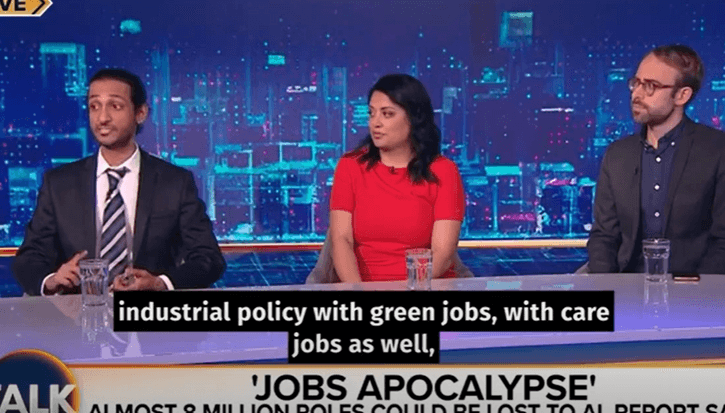On EU immigration, both camps need to pay careful attention to public opinion
Article
‘There’s a lot of people in the EU who supply gaps in the service industries, the land workers … fantastic work ethic … lovely people … There’s a lot of rubbish talked about benefits and the fact people can just walk into a council house, and I know that isn’t correct.’
‘It just seems bizarre in this day and age that we’re still having to fork out for people coming over … it’s not a level playing field because we are a wealthy country and we’re dealing with other countries who are not on the same level as us. And there has to be a cap. There has to be a cap.’
Where do these two quotes come from? A furious exchange between the Remain and Leave camps? A lively debate between an immigration sceptic and an open borders Europhile? In fact, the two quotes come from the same person, within the space of 10 minutes, during a conversation with the public on freedom of movement we held this week. It shows that the debate about EU immigration isn’t quite as straightforward as some would think.
With an in/out referendum in June increasingly likely, the Remain and Leave campaigns are still struggling to grapple with the key issue of immigration. In the past three months, IPPR held three sessions with around 50 members of the public on freedom of movement, speaking with over-40s in Peterborough, Glasgow and Havering. We filtered out those firmly opposed or in favour of free movement to leave those in the ‘moderate middle’ – the key battleground in the upcoming referendum. Our research suggests some important lessons for both sides.
Lessons for Remain
1. Take concerns seriously
From our conversations, it’s clear that many people have deeply held concerns about EU immigration – particularly with respect to pressures on public services and access to welfare, and to a lesser degree on public security and undercutting of workers. If they want to get a hearing on this issue, Remain supporters must acknowledge these concerns as legitimate – and, more importantly, give serious answers for how they can be addressed without leaving the EU and how free movement can be made sustainable in the long term.
2. Avoid defeatism
A tempting response for Remain supporters is to argue that immigration will remain high (or increase) even if Britain were to leave the EU. Some have argued that countries outside the EU like Norway or Switzerland have more migrants per head than the UK, while others have suggested that opting out of free movement would simply mean many EU migrants coming via alternative immigration routes. But for many we spoke to this just looks like admitting defeat and denying voters a choice. Similarly, catastrophic scenarios in which UK citizens in other EU countries get thrown out after Brexit risks looking like simple scaremongering. A referendum is a chance for people to have a say – and if they are told that on immigration they simply don’t have one then they won’t be impressed.
3. Continue to press for reform
Participants in our Peterborough group were unconvinced by the proposed free movement reforms contained in this week’s draft agreement. While the focus of the reforms reflected concerns – making the benefits system more contributory and ensuring public security – the people we spoke to were sceptical on the details of the deal. Some felt that the emergency brake wouldn’t work in practice; others were outraged that the UK would have to get consent from other EU countries before being able to pull the emergency brake and limit access to benefits; and many simply felt that the deal did not go far enough, particularly on the issue of paying child benefit to families with children abroad.
It is therefore not an option to say ‘job done’ on immigration. Yes, Remain supporters should highlight the reforms that have been made, including less talked-about changes like the restrictions on universal credit for first-time EU jobseekers. But to retain credibility they also need to continue to make the case for reform at both the domestic and EU level, beyond the date of the referendum.
Lessons for Leave
1. Tone matters
While many people expressed strongly held concerns about freedom of movement, they made clear their admiration for EU migrants, praised their contribution to the country, and recoiled from anything that sounded like bigotry or intolerance. Immigration is surely the Leave campaign’s strongest card – but it could easily backfire if the campaign becomes too negative. A positive tone that marries a belief in immigration controls on EU migrants alongside a broadly tolerant, pro-immigration outlook is likely to be the most effective approach.
In particular, the refugee crisis poses a big challenge: if Leave supporters exploit it too readily they risk sounding insensitive. Better to take the approach of some Leave supporters and argue that controlling EU migration will allow for a more generous resettlement programme for refugees.
2. Get the facts right
Many of the people we spoke to who were concerned about immigration from the EU were also worried about media misinformation about immigrants. They were openly hungry to know the truth about EU migrants’ entitlements and interaction with welfare and public services, and were particularly wary of negative stories about immigration. As with its tone, the Leave campaign’s analysis of the impact of EU migration is under particular scrutiny, and there is a danger that people will switch off if they start to spot inaccuracies.
3. Spell out a potential deal
Our session this week produced a clear conclusion: for those whose overriding concern about the EU is freedom of movement, pulling out of the EU while retaining free movement as part of the deal to keep the UK in the single market is a non-starter. The deal they want involves jettisoning free movement altogether. So Leave supporters need to be crystal clear about their position: do they want to retain membership of the single market, in which case there is little point arguing against free movement, or is the real aim to restrict free movement and control numbers? When given the different Leave options in our sessions this week, in large part people took the latter option. It may not be credible to simultaneously critique EU immigration and leave open the option of maintaining current levels.
\\\
From our research it’s clear that, on immigration, Remain supporters have the biggest hill to climb: concerns about freedom of movement are high and they’re not going away now that the emergency brake is on the table. But there are important lessons for Leave supporters too: broadly speaking, the people we spoke to told a positive story about EU migrants, valued their contribution to the country, and were wary of anything that looked like bigotry. Both sides therefore need to walk a fine line between dismissing concerns and expressing them too negatively.
Related items

Who gets a good deal? Revealing public attitudes to transport in Great Britain
Transport isn’t working. That’s the message from the British public. This is especially true if you’re on a low income, disabled or living in the countryside. The cost of living crisis has exposed the shortcomings of our transport system,…
Bhargav Srinivasa Desikan on TalkTV discussing AI
IPPR's Bhargav Srinivasa Desikan on TalkTV discussing his new report on the impact of generative AI on the UK labour market.
Transformed by AI: How generative artificial intelligence could affect work in the UK – and how to manage it
Technological change is a good thing. It has brought exponential gains to living standards and is the foundation of modern society. Yet unmanaged technological change has always come with risks and disruptions.